Corporate Social Responsibility: An Ethical Analysis of Cullen Group
VerifiedAdded on 2023/05/27
|11
|3937
|312
Case Study
AI Summary
This case study examines the ethical issues surrounding Cullen Group, focusing on its corporate social responsibility, decision-making processes, and corporate culture. The analysis reveals that Cullen Group prioritized short-term financial gains over the well-being of its stakeholders, leading to insolvent trading and potential illegal phoenix activity. The Queensland Building and Construction Commission (QBCC) also faced scrutiny for its handling of the situation. The case study applies ethical theories like egoism and deontology to evaluate the company's actions and recommends improvements in corporate social responsibility programs, risk management strategies, and corporate culture to foster ethical decision-making and rebuild stakeholder trust. The analysis also considers the utilitarian ethical theory and its implications for stakeholder engagement and transparency in financial matters. The second article discusses a class action between ISGM and its subcontractors.
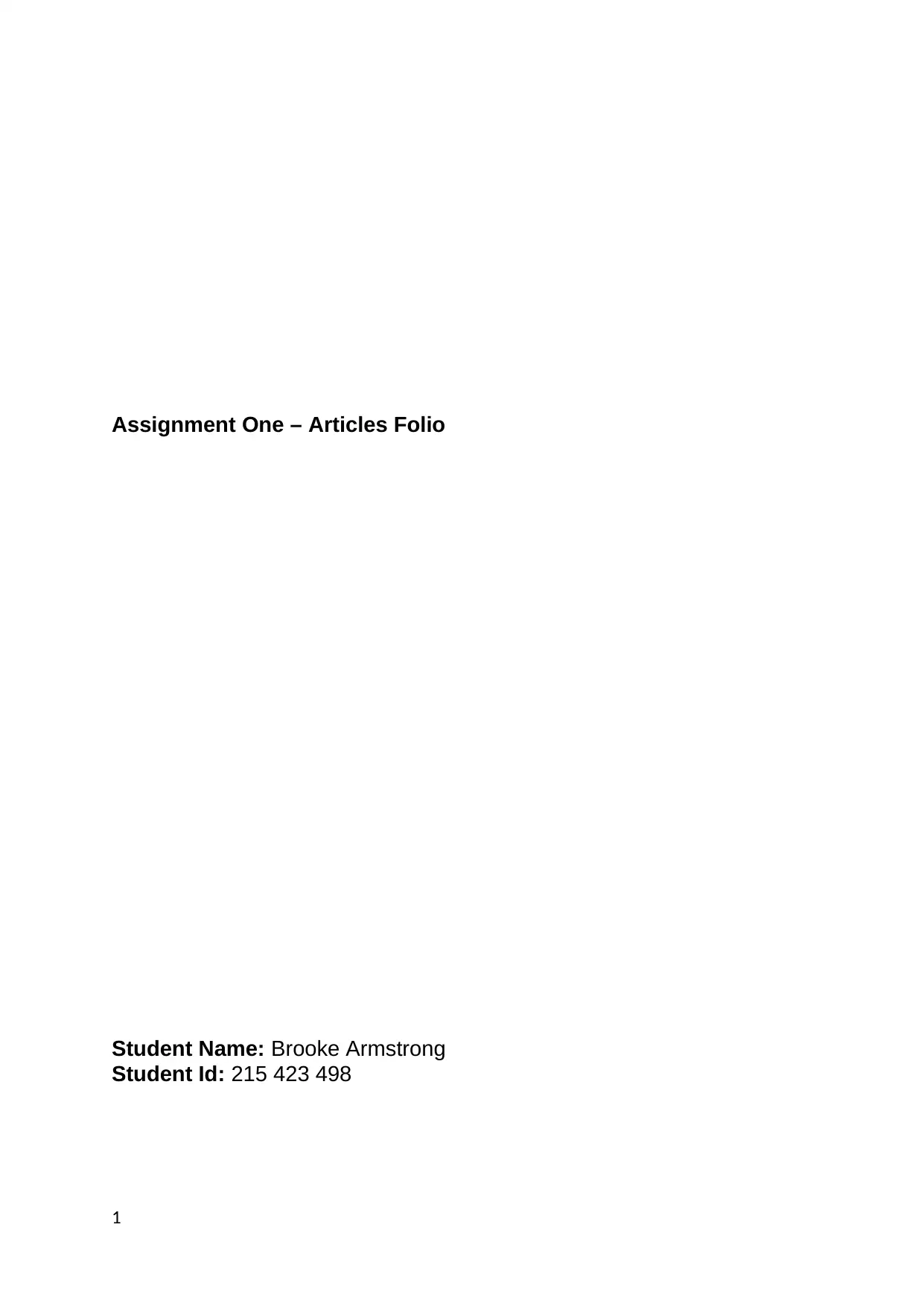
Assignment One – Articles Folio
Student Name: Brooke Armstrong
Student Id: 215 423 498
1
Student Name: Brooke Armstrong
Student Id: 215 423 498
1
Paraphrase This Document
Need a fresh take? Get an instant paraphrase of this document with our AI Paraphraser
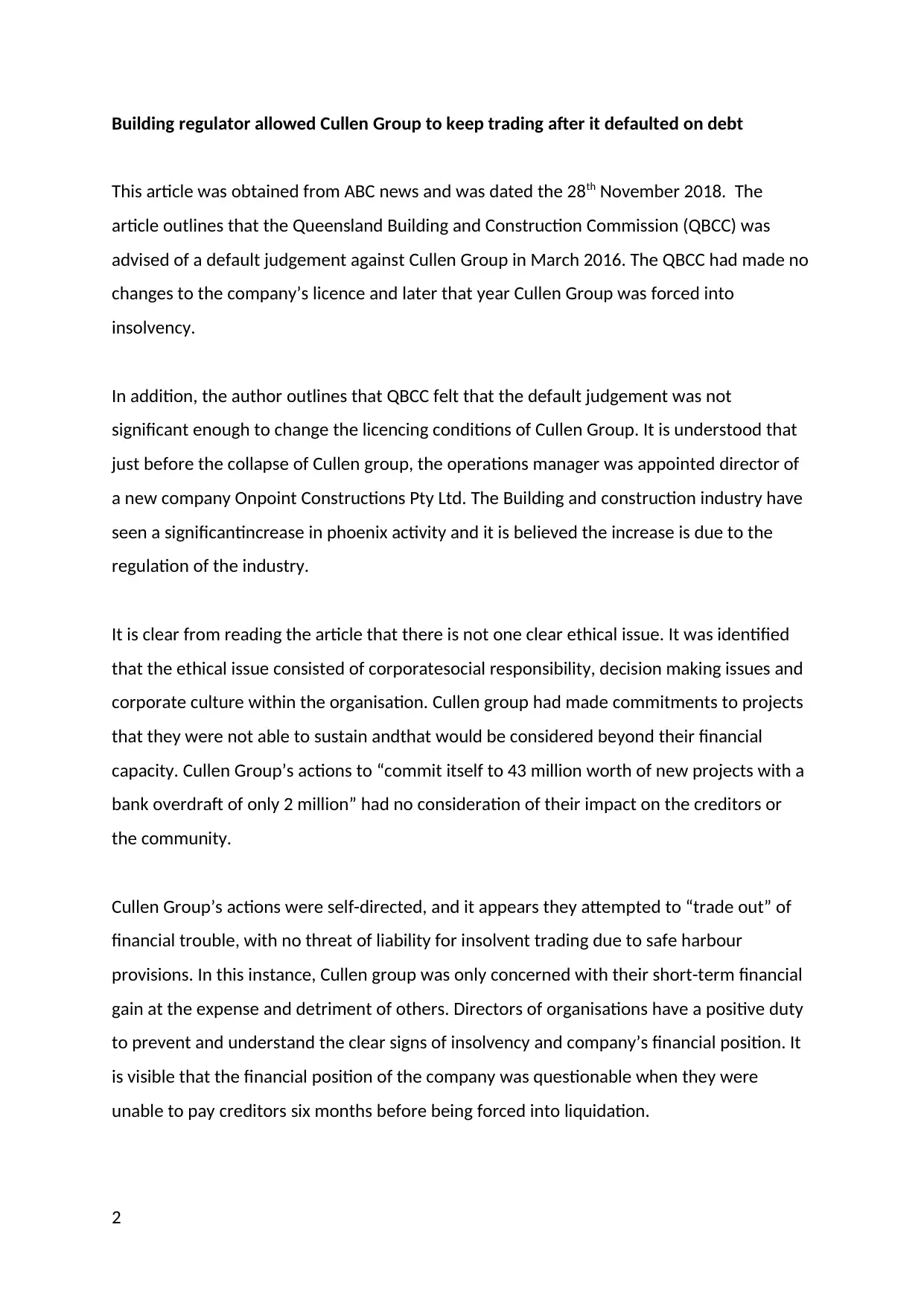
Building regulator allowed Cullen Group to keep trading after it defaulted on debt
This article was obtained from ABC news and was dated the 28th November 2018. The
article outlines that the Queensland Building and Construction Commission (QBCC) was
advised of a default judgement against Cullen Group in March 2016. The QBCC had made no
changes to the company’s licence and later that year Cullen Group was forced into
insolvency.
In addition, the author outlines that QBCC felt that the default judgement was not
significant enough to change the licencing conditions of Cullen Group. It is understood that
just before the collapse of Cullen group, the operations manager was appointed director of
a new company Onpoint Constructions Pty Ltd. The Building and construction industry have
seen a significantincrease in phoenix activity and it is believed the increase is due to the
regulation of the industry.
It is clear from reading the article that there is not one clear ethical issue. It was identified
that the ethical issue consisted of corporatesocial responsibility, decision making issues and
corporate culture within the organisation. Cullen group had made commitments to projects
that they were not able to sustain andthat would be considered beyond their financial
capacity. Cullen Group’s actions to “commit itself to 43 million worth of new projects with a
bank overdraft of only 2 million” had no consideration of their impact on the creditors or
the community.
Cullen Group’s actions were self-directed, and it appears they attempted to “trade out” of
financial trouble, with no threat of liability for insolvent trading due to safe harbour
provisions. In this instance, Cullen group was only concerned with their short-term financial
gain at the expense and detriment of others. Directors of organisations have a positive duty
to prevent and understand the clear signs of insolvency and company’s financial position. It
is visible that the financial position of the company was questionable when they were
unable to pay creditors six months before being forced into liquidation.
2
This article was obtained from ABC news and was dated the 28th November 2018. The
article outlines that the Queensland Building and Construction Commission (QBCC) was
advised of a default judgement against Cullen Group in March 2016. The QBCC had made no
changes to the company’s licence and later that year Cullen Group was forced into
insolvency.
In addition, the author outlines that QBCC felt that the default judgement was not
significant enough to change the licencing conditions of Cullen Group. It is understood that
just before the collapse of Cullen group, the operations manager was appointed director of
a new company Onpoint Constructions Pty Ltd. The Building and construction industry have
seen a significantincrease in phoenix activity and it is believed the increase is due to the
regulation of the industry.
It is clear from reading the article that there is not one clear ethical issue. It was identified
that the ethical issue consisted of corporatesocial responsibility, decision making issues and
corporate culture within the organisation. Cullen group had made commitments to projects
that they were not able to sustain andthat would be considered beyond their financial
capacity. Cullen Group’s actions to “commit itself to 43 million worth of new projects with a
bank overdraft of only 2 million” had no consideration of their impact on the creditors or
the community.
Cullen Group’s actions were self-directed, and it appears they attempted to “trade out” of
financial trouble, with no threat of liability for insolvent trading due to safe harbour
provisions. In this instance, Cullen group was only concerned with their short-term financial
gain at the expense and detriment of others. Directors of organisations have a positive duty
to prevent and understand the clear signs of insolvency and company’s financial position. It
is visible that the financial position of the company was questionable when they were
unable to pay creditors six months before being forced into liquidation.
2
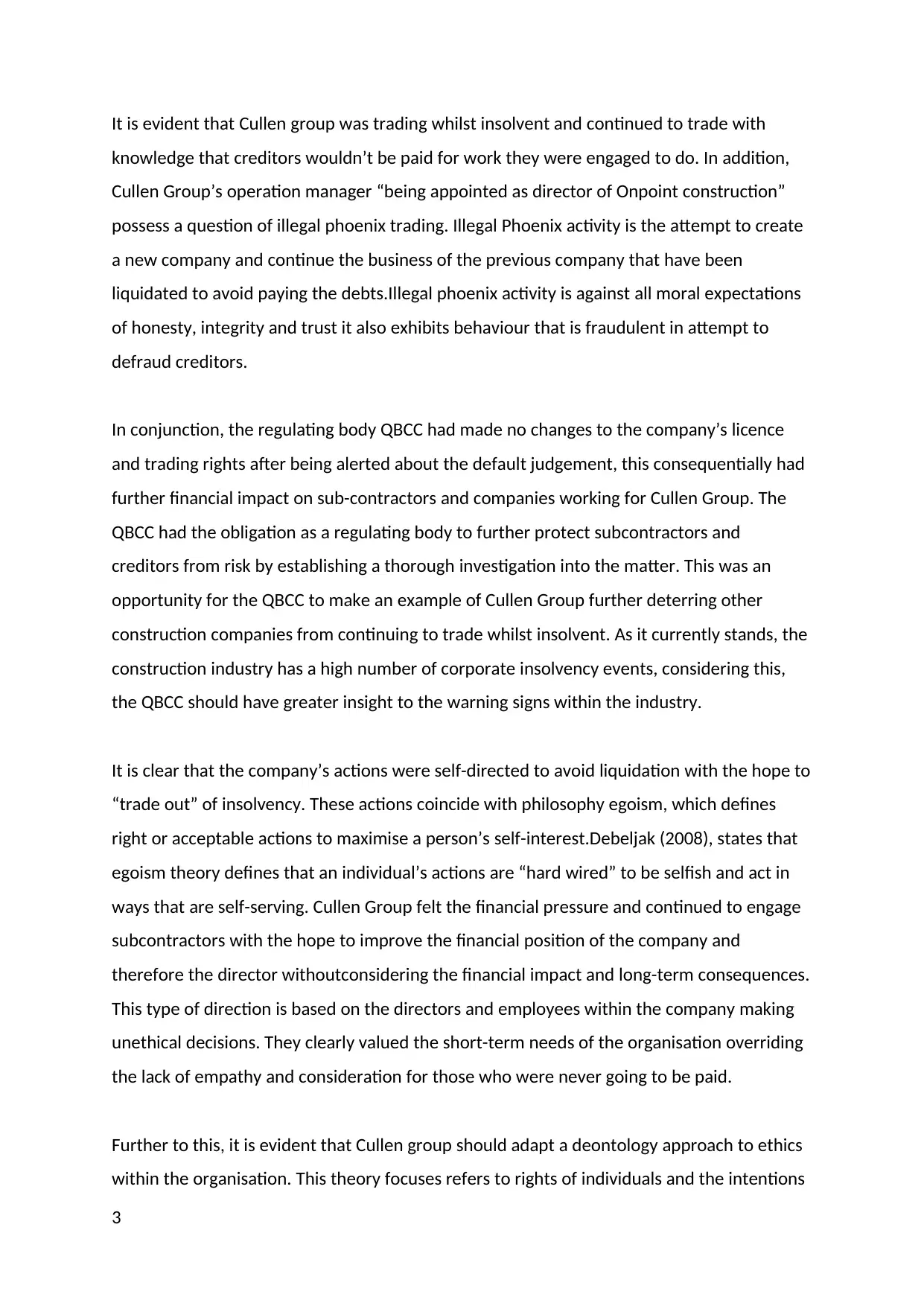
It is evident that Cullen group was trading whilst insolvent and continued to trade with
knowledge that creditors wouldn’t be paid for work they were engaged to do. In addition,
Cullen Group’s operation manager “being appointed as director of Onpoint construction”
possess a question of illegal phoenix trading. Illegal Phoenix activity is the attempt to create
a new company and continue the business of the previous company that have been
liquidated to avoid paying the debts.Illegal phoenix activity is against all moral expectations
of honesty, integrity and trust it also exhibits behaviour that is fraudulent in attempt to
defraud creditors.
In conjunction, the regulating body QBCC had made no changes to the company’s licence
and trading rights after being alerted about the default judgement, this consequentially had
further financial impact on sub-contractors and companies working for Cullen Group. The
QBCC had the obligation as a regulating body to further protect subcontractors and
creditors from risk by establishing a thorough investigation into the matter. This was an
opportunity for the QBCC to make an example of Cullen Group further deterring other
construction companies from continuing to trade whilst insolvent. As it currently stands, the
construction industry has a high number of corporate insolvency events, considering this,
the QBCC should have greater insight to the warning signs within the industry.
It is clear that the company’s actions were self-directed to avoid liquidation with the hope to
“trade out” of insolvency. These actions coincide with philosophy egoism, which defines
right or acceptable actions to maximise a person’s self-interest.Debeljak (2008), states that
egoism theory defines that an individual’s actions are “hard wired” to be selfish and act in
ways that are self-serving. Cullen Group felt the financial pressure and continued to engage
subcontractors with the hope to improve the financial position of the company and
therefore the director withoutconsidering the financial impact and long-term consequences.
This type of direction is based on the directors and employees within the company making
unethical decisions. They clearly valued the short-term needs of the organisation overriding
the lack of empathy and consideration for those who were never going to be paid.
Further to this, it is evident that Cullen group should adapt a deontology approach to ethics
within the organisation. This theory focuses refers to rights of individuals and the intentions
3
knowledge that creditors wouldn’t be paid for work they were engaged to do. In addition,
Cullen Group’s operation manager “being appointed as director of Onpoint construction”
possess a question of illegal phoenix trading. Illegal Phoenix activity is the attempt to create
a new company and continue the business of the previous company that have been
liquidated to avoid paying the debts.Illegal phoenix activity is against all moral expectations
of honesty, integrity and trust it also exhibits behaviour that is fraudulent in attempt to
defraud creditors.
In conjunction, the regulating body QBCC had made no changes to the company’s licence
and trading rights after being alerted about the default judgement, this consequentially had
further financial impact on sub-contractors and companies working for Cullen Group. The
QBCC had the obligation as a regulating body to further protect subcontractors and
creditors from risk by establishing a thorough investigation into the matter. This was an
opportunity for the QBCC to make an example of Cullen Group further deterring other
construction companies from continuing to trade whilst insolvent. As it currently stands, the
construction industry has a high number of corporate insolvency events, considering this,
the QBCC should have greater insight to the warning signs within the industry.
It is clear that the company’s actions were self-directed to avoid liquidation with the hope to
“trade out” of insolvency. These actions coincide with philosophy egoism, which defines
right or acceptable actions to maximise a person’s self-interest.Debeljak (2008), states that
egoism theory defines that an individual’s actions are “hard wired” to be selfish and act in
ways that are self-serving. Cullen Group felt the financial pressure and continued to engage
subcontractors with the hope to improve the financial position of the company and
therefore the director withoutconsidering the financial impact and long-term consequences.
This type of direction is based on the directors and employees within the company making
unethical decisions. They clearly valued the short-term needs of the organisation overriding
the lack of empathy and consideration for those who were never going to be paid.
Further to this, it is evident that Cullen group should adapt a deontology approach to ethics
within the organisation. This theory focuses refers to rights of individuals and the intentions
3
⊘ This is a preview!⊘
Do you want full access?
Subscribe today to unlock all pages.

Trusted by 1+ million students worldwide
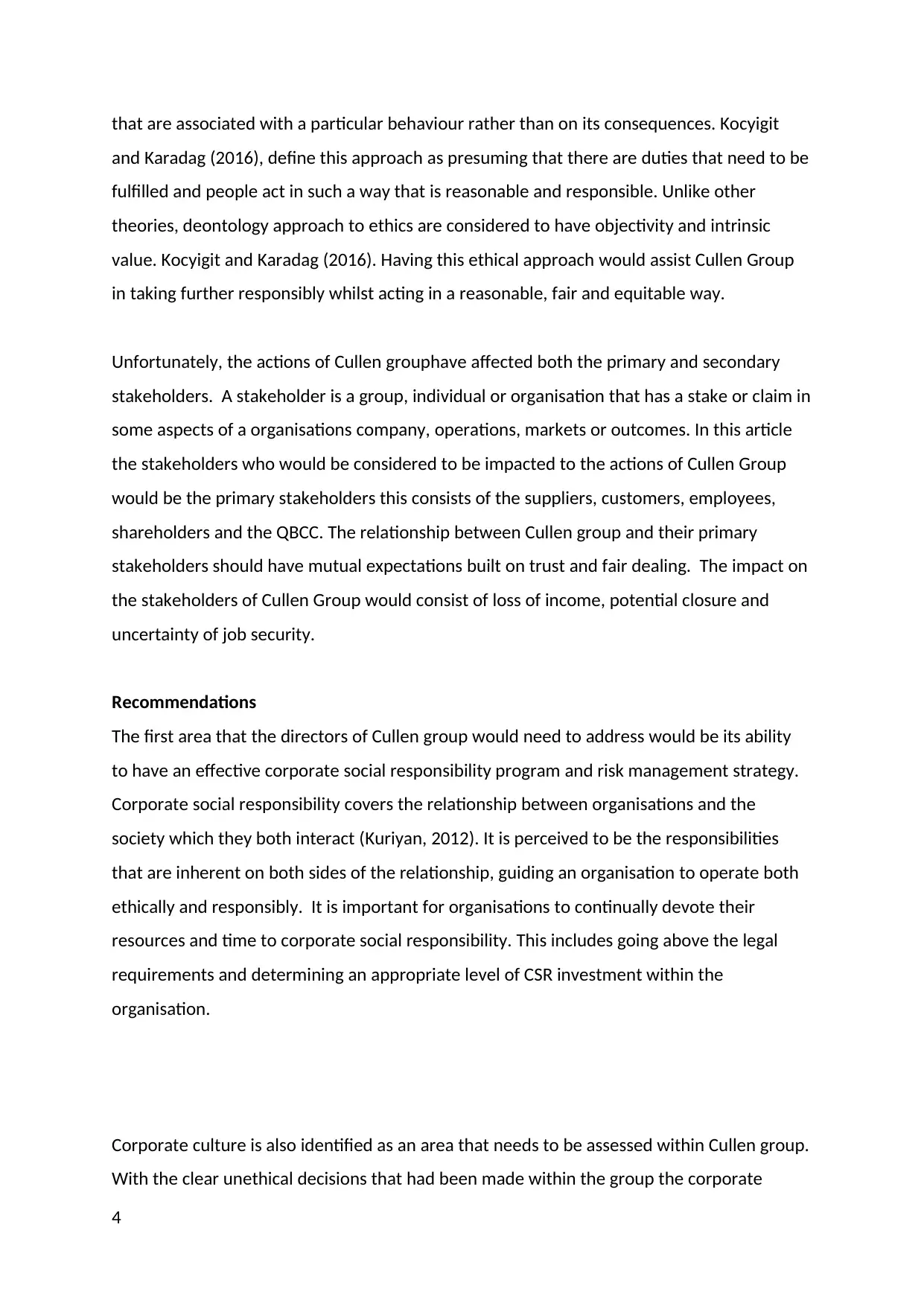
that are associated with a particular behaviour rather than on its consequences. Kocyigit
and Karadag (2016), define this approach as presuming that there are duties that need to be
fulfilled and people act in such a way that is reasonable and responsible. Unlike other
theories, deontology approach to ethics are considered to have objectivity and intrinsic
value. Kocyigit and Karadag (2016). Having this ethical approach would assist Cullen Group
in taking further responsibly whilst acting in a reasonable, fair and equitable way.
Unfortunately, the actions of Cullen grouphave affected both the primary and secondary
stakeholders. A stakeholder is a group, individual or organisation that has a stake or claim in
some aspects of a organisations company, operations, markets or outcomes. In this article
the stakeholders who would be considered to be impacted to the actions of Cullen Group
would be the primary stakeholders this consists of the suppliers, customers, employees,
shareholders and the QBCC. The relationship between Cullen group and their primary
stakeholders should have mutual expectations built on trust and fair dealing. The impact on
the stakeholders of Cullen Group would consist of loss of income, potential closure and
uncertainty of job security.
Recommendations
The first area that the directors of Cullen group would need to address would be its ability
to have an effective corporate social responsibility program and risk management strategy.
Corporate social responsibility covers the relationship between organisations and the
society which they both interact (Kuriyan, 2012). It is perceived to be the responsibilities
that are inherent on both sides of the relationship, guiding an organisation to operate both
ethically and responsibly. It is important for organisations to continually devote their
resources and time to corporate social responsibility. This includes going above the legal
requirements and determining an appropriate level of CSR investment within the
organisation.
Corporate culture is also identified as an area that needs to be assessed within Cullen group.
With the clear unethical decisions that had been made within the group the corporate
4
and Karadag (2016), define this approach as presuming that there are duties that need to be
fulfilled and people act in such a way that is reasonable and responsible. Unlike other
theories, deontology approach to ethics are considered to have objectivity and intrinsic
value. Kocyigit and Karadag (2016). Having this ethical approach would assist Cullen Group
in taking further responsibly whilst acting in a reasonable, fair and equitable way.
Unfortunately, the actions of Cullen grouphave affected both the primary and secondary
stakeholders. A stakeholder is a group, individual or organisation that has a stake or claim in
some aspects of a organisations company, operations, markets or outcomes. In this article
the stakeholders who would be considered to be impacted to the actions of Cullen Group
would be the primary stakeholders this consists of the suppliers, customers, employees,
shareholders and the QBCC. The relationship between Cullen group and their primary
stakeholders should have mutual expectations built on trust and fair dealing. The impact on
the stakeholders of Cullen Group would consist of loss of income, potential closure and
uncertainty of job security.
Recommendations
The first area that the directors of Cullen group would need to address would be its ability
to have an effective corporate social responsibility program and risk management strategy.
Corporate social responsibility covers the relationship between organisations and the
society which they both interact (Kuriyan, 2012). It is perceived to be the responsibilities
that are inherent on both sides of the relationship, guiding an organisation to operate both
ethically and responsibly. It is important for organisations to continually devote their
resources and time to corporate social responsibility. This includes going above the legal
requirements and determining an appropriate level of CSR investment within the
organisation.
Corporate culture is also identified as an area that needs to be assessed within Cullen group.
With the clear unethical decisions that had been made within the group the corporate
4
Paraphrase This Document
Need a fresh take? Get an instant paraphrase of this document with our AI Paraphraser
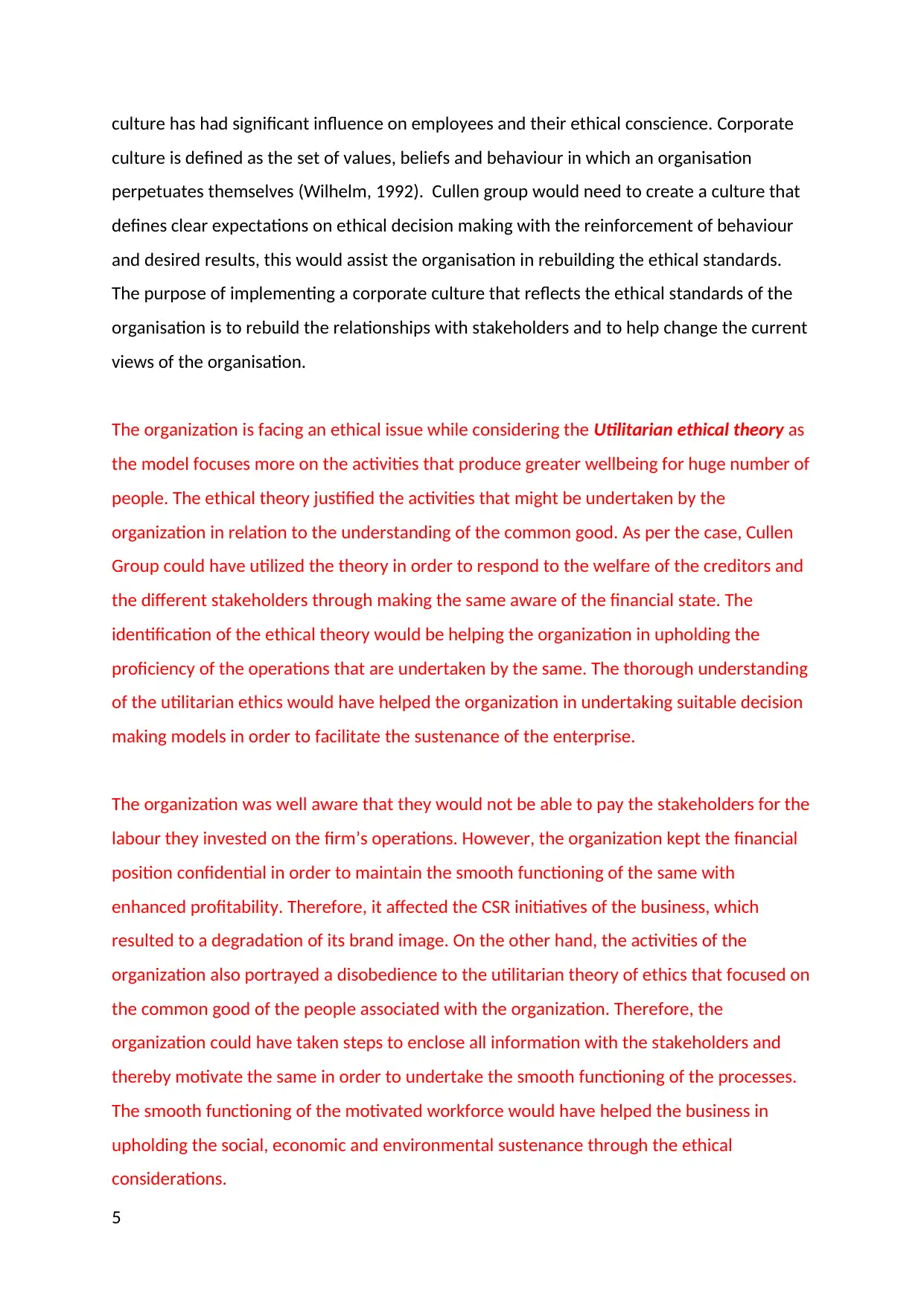
culture has had significant influence on employees and their ethical conscience. Corporate
culture is defined as the set of values, beliefs and behaviour in which an organisation
perpetuates themselves (Wilhelm, 1992). Cullen group would need to create a culture that
defines clear expectations on ethical decision making with the reinforcement of behaviour
and desired results, this would assist the organisation in rebuilding the ethical standards.
The purpose of implementing a corporate culture that reflects the ethical standards of the
organisation is to rebuild the relationships with stakeholders and to help change the current
views of the organisation.
The organization is facing an ethical issue while considering the Utilitarian ethical theory as
the model focuses more on the activities that produce greater wellbeing for huge number of
people. The ethical theory justified the activities that might be undertaken by the
organization in relation to the understanding of the common good. As per the case, Cullen
Group could have utilized the theory in order to respond to the welfare of the creditors and
the different stakeholders through making the same aware of the financial state. The
identification of the ethical theory would be helping the organization in upholding the
proficiency of the operations that are undertaken by the same. The thorough understanding
of the utilitarian ethics would have helped the organization in undertaking suitable decision
making models in order to facilitate the sustenance of the enterprise.
The organization was well aware that they would not be able to pay the stakeholders for the
labour they invested on the firm’s operations. However, the organization kept the financial
position confidential in order to maintain the smooth functioning of the same with
enhanced profitability. Therefore, it affected the CSR initiatives of the business, which
resulted to a degradation of its brand image. On the other hand, the activities of the
organization also portrayed a disobedience to the utilitarian theory of ethics that focused on
the common good of the people associated with the organization. Therefore, the
organization could have taken steps to enclose all information with the stakeholders and
thereby motivate the same in order to undertake the smooth functioning of the processes.
The smooth functioning of the motivated workforce would have helped the business in
upholding the social, economic and environmental sustenance through the ethical
considerations.
5
culture is defined as the set of values, beliefs and behaviour in which an organisation
perpetuates themselves (Wilhelm, 1992). Cullen group would need to create a culture that
defines clear expectations on ethical decision making with the reinforcement of behaviour
and desired results, this would assist the organisation in rebuilding the ethical standards.
The purpose of implementing a corporate culture that reflects the ethical standards of the
organisation is to rebuild the relationships with stakeholders and to help change the current
views of the organisation.
The organization is facing an ethical issue while considering the Utilitarian ethical theory as
the model focuses more on the activities that produce greater wellbeing for huge number of
people. The ethical theory justified the activities that might be undertaken by the
organization in relation to the understanding of the common good. As per the case, Cullen
Group could have utilized the theory in order to respond to the welfare of the creditors and
the different stakeholders through making the same aware of the financial state. The
identification of the ethical theory would be helping the organization in upholding the
proficiency of the operations that are undertaken by the same. The thorough understanding
of the utilitarian ethics would have helped the organization in undertaking suitable decision
making models in order to facilitate the sustenance of the enterprise.
The organization was well aware that they would not be able to pay the stakeholders for the
labour they invested on the firm’s operations. However, the organization kept the financial
position confidential in order to maintain the smooth functioning of the same with
enhanced profitability. Therefore, it affected the CSR initiatives of the business, which
resulted to a degradation of its brand image. On the other hand, the activities of the
organization also portrayed a disobedience to the utilitarian theory of ethics that focused on
the common good of the people associated with the organization. Therefore, the
organization could have taken steps to enclose all information with the stakeholders and
thereby motivate the same in order to undertake the smooth functioning of the processes.
The smooth functioning of the motivated workforce would have helped the business in
upholding the social, economic and environmental sustenance through the ethical
considerations.
5
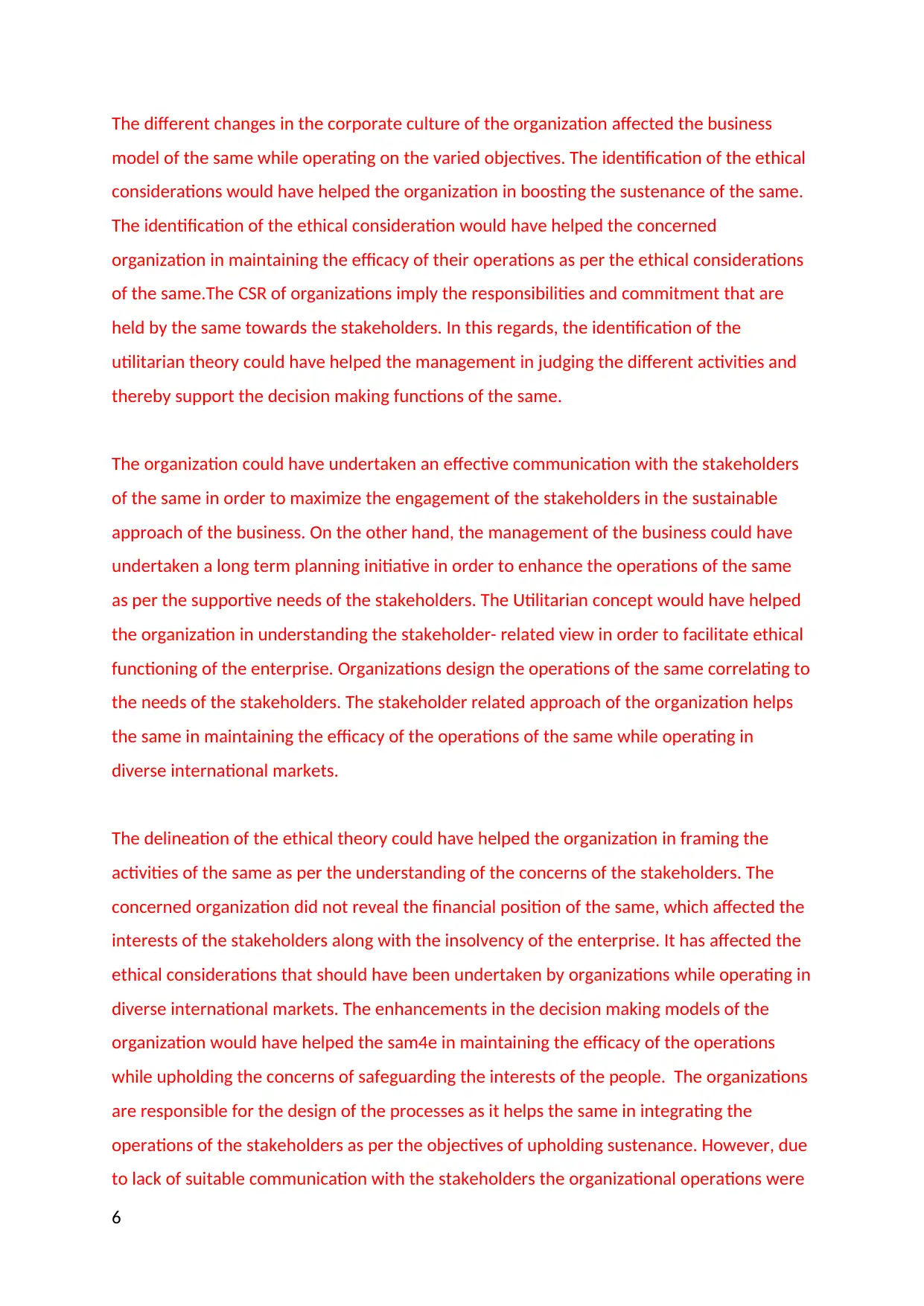
The different changes in the corporate culture of the organization affected the business
model of the same while operating on the varied objectives. The identification of the ethical
considerations would have helped the organization in boosting the sustenance of the same.
The identification of the ethical consideration would have helped the concerned
organization in maintaining the efficacy of their operations as per the ethical considerations
of the same.The CSR of organizations imply the responsibilities and commitment that are
held by the same towards the stakeholders. In this regards, the identification of the
utilitarian theory could have helped the management in judging the different activities and
thereby support the decision making functions of the same.
The organization could have undertaken an effective communication with the stakeholders
of the same in order to maximize the engagement of the stakeholders in the sustainable
approach of the business. On the other hand, the management of the business could have
undertaken a long term planning initiative in order to enhance the operations of the same
as per the supportive needs of the stakeholders. The Utilitarian concept would have helped
the organization in understanding the stakeholder- related view in order to facilitate ethical
functioning of the enterprise. Organizations design the operations of the same correlating to
the needs of the stakeholders. The stakeholder related approach of the organization helps
the same in maintaining the efficacy of the operations of the same while operating in
diverse international markets.
The delineation of the ethical theory could have helped the organization in framing the
activities of the same as per the understanding of the concerns of the stakeholders. The
concerned organization did not reveal the financial position of the same, which affected the
interests of the stakeholders along with the insolvency of the enterprise. It has affected the
ethical considerations that should have been undertaken by organizations while operating in
diverse international markets. The enhancements in the decision making models of the
organization would have helped the sam4e in maintaining the efficacy of the operations
while upholding the concerns of safeguarding the interests of the people. The organizations
are responsible for the design of the processes as it helps the same in integrating the
operations of the stakeholders as per the objectives of upholding sustenance. However, due
to lack of suitable communication with the stakeholders the organizational operations were
6
model of the same while operating on the varied objectives. The identification of the ethical
considerations would have helped the organization in boosting the sustenance of the same.
The identification of the ethical consideration would have helped the concerned
organization in maintaining the efficacy of their operations as per the ethical considerations
of the same.The CSR of organizations imply the responsibilities and commitment that are
held by the same towards the stakeholders. In this regards, the identification of the
utilitarian theory could have helped the management in judging the different activities and
thereby support the decision making functions of the same.
The organization could have undertaken an effective communication with the stakeholders
of the same in order to maximize the engagement of the stakeholders in the sustainable
approach of the business. On the other hand, the management of the business could have
undertaken a long term planning initiative in order to enhance the operations of the same
as per the supportive needs of the stakeholders. The Utilitarian concept would have helped
the organization in understanding the stakeholder- related view in order to facilitate ethical
functioning of the enterprise. Organizations design the operations of the same correlating to
the needs of the stakeholders. The stakeholder related approach of the organization helps
the same in maintaining the efficacy of the operations of the same while operating in
diverse international markets.
The delineation of the ethical theory could have helped the organization in framing the
activities of the same as per the understanding of the concerns of the stakeholders. The
concerned organization did not reveal the financial position of the same, which affected the
interests of the stakeholders along with the insolvency of the enterprise. It has affected the
ethical considerations that should have been undertaken by organizations while operating in
diverse international markets. The enhancements in the decision making models of the
organization would have helped the sam4e in maintaining the efficacy of the operations
while upholding the concerns of safeguarding the interests of the people. The organizations
are responsible for the design of the processes as it helps the same in integrating the
operations of the stakeholders as per the objectives of upholding sustenance. However, due
to lack of suitable communication with the stakeholders the organizational operations were
6
⊘ This is a preview!⊘
Do you want full access?
Subscribe today to unlock all pages.

Trusted by 1+ million students worldwide
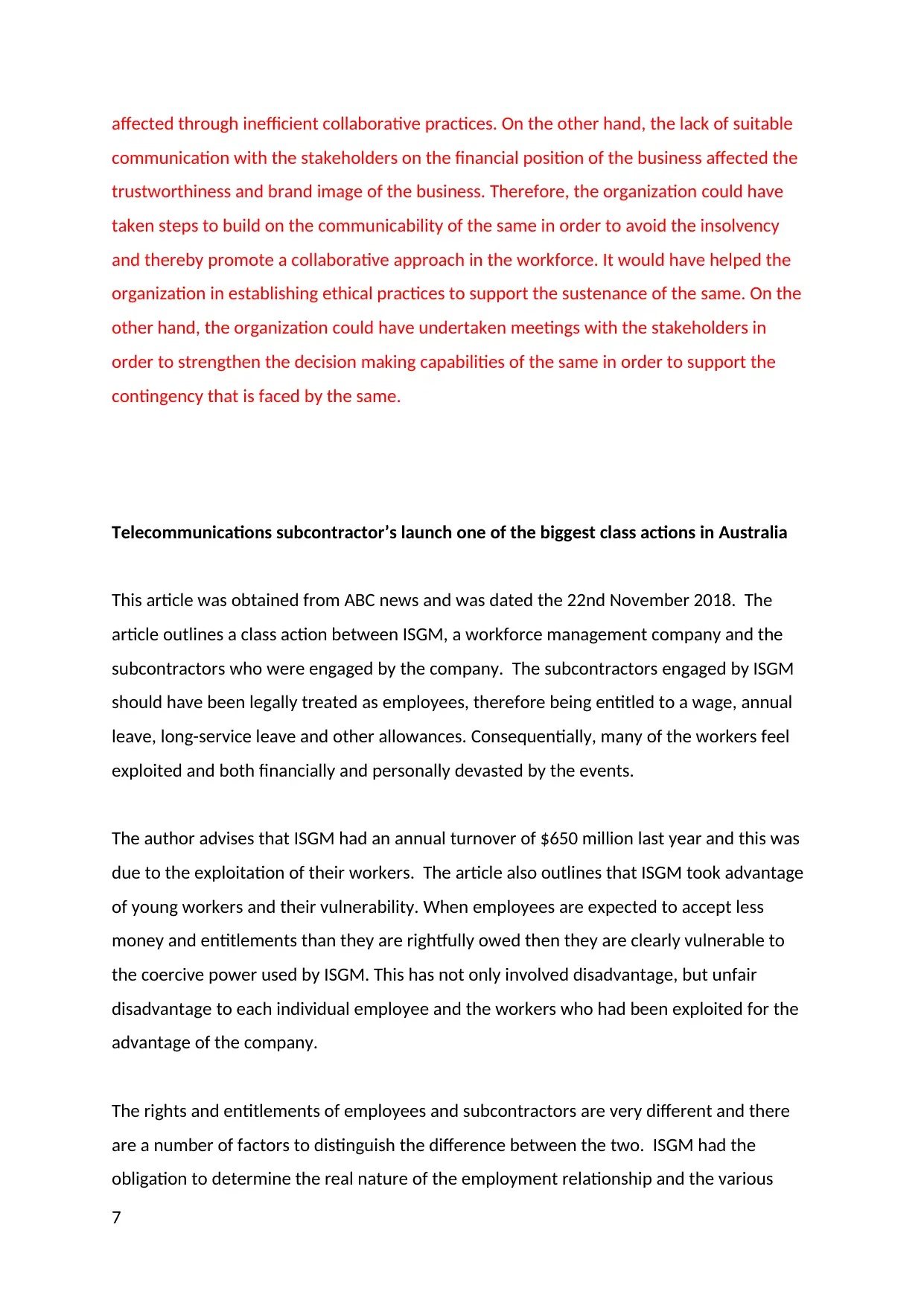
affected through inefficient collaborative practices. On the other hand, the lack of suitable
communication with the stakeholders on the financial position of the business affected the
trustworthiness and brand image of the business. Therefore, the organization could have
taken steps to build on the communicability of the same in order to avoid the insolvency
and thereby promote a collaborative approach in the workforce. It would have helped the
organization in establishing ethical practices to support the sustenance of the same. On the
other hand, the organization could have undertaken meetings with the stakeholders in
order to strengthen the decision making capabilities of the same in order to support the
contingency that is faced by the same.
Telecommunications subcontractor’s launch one of the biggest class actions in Australia
This article was obtained from ABC news and was dated the 22nd November 2018. The
article outlines a class action between ISGM, a workforce management company and the
subcontractors who were engaged by the company. The subcontractors engaged by ISGM
should have been legally treated as employees, therefore being entitled to a wage, annual
leave, long-service leave and other allowances. Consequentially, many of the workers feel
exploited and both financially and personally devasted by the events.
The author advises that ISGM had an annual turnover of $650 million last year and this was
due to the exploitation of their workers. The article also outlines that ISGM took advantage
of young workers and their vulnerability. When employees are expected to accept less
money and entitlements than they are rightfully owed then they are clearly vulnerable to
the coercive power used by ISGM. This has not only involved disadvantage, but unfair
disadvantage to each individual employee and the workers who had been exploited for the
advantage of the company.
The rights and entitlements of employees and subcontractors are very different and there
are a number of factors to distinguish the difference between the two. ISGM had the
obligation to determine the real nature of the employment relationship and the various
7
communication with the stakeholders on the financial position of the business affected the
trustworthiness and brand image of the business. Therefore, the organization could have
taken steps to build on the communicability of the same in order to avoid the insolvency
and thereby promote a collaborative approach in the workforce. It would have helped the
organization in establishing ethical practices to support the sustenance of the same. On the
other hand, the organization could have undertaken meetings with the stakeholders in
order to strengthen the decision making capabilities of the same in order to support the
contingency that is faced by the same.
Telecommunications subcontractor’s launch one of the biggest class actions in Australia
This article was obtained from ABC news and was dated the 22nd November 2018. The
article outlines a class action between ISGM, a workforce management company and the
subcontractors who were engaged by the company. The subcontractors engaged by ISGM
should have been legally treated as employees, therefore being entitled to a wage, annual
leave, long-service leave and other allowances. Consequentially, many of the workers feel
exploited and both financially and personally devasted by the events.
The author advises that ISGM had an annual turnover of $650 million last year and this was
due to the exploitation of their workers. The article also outlines that ISGM took advantage
of young workers and their vulnerability. When employees are expected to accept less
money and entitlements than they are rightfully owed then they are clearly vulnerable to
the coercive power used by ISGM. This has not only involved disadvantage, but unfair
disadvantage to each individual employee and the workers who had been exploited for the
advantage of the company.
The rights and entitlements of employees and subcontractors are very different and there
are a number of factors to distinguish the difference between the two. ISGM had the
obligation to determine the real nature of the employment relationship and the various
7
Paraphrase This Document
Need a fresh take? Get an instant paraphrase of this document with our AI Paraphraser
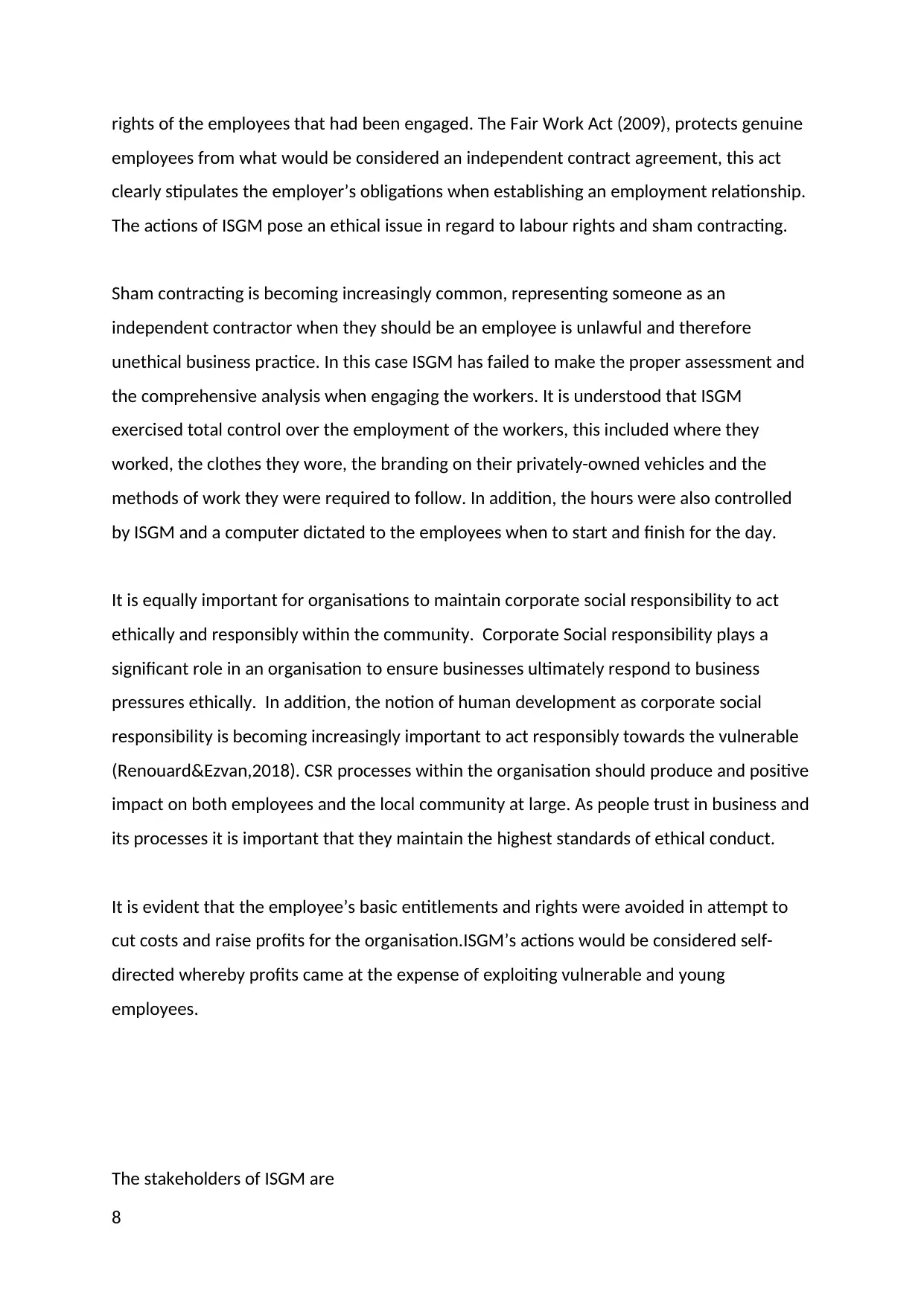
rights of the employees that had been engaged. The Fair Work Act (2009), protects genuine
employees from what would be considered an independent contract agreement, this act
clearly stipulates the employer’s obligations when establishing an employment relationship.
The actions of ISGM pose an ethical issue in regard to labour rights and sham contracting.
Sham contracting is becoming increasingly common, representing someone as an
independent contractor when they should be an employee is unlawful and therefore
unethical business practice. In this case ISGM has failed to make the proper assessment and
the comprehensive analysis when engaging the workers. It is understood that ISGM
exercised total control over the employment of the workers, this included where they
worked, the clothes they wore, the branding on their privately-owned vehicles and the
methods of work they were required to follow. In addition, the hours were also controlled
by ISGM and a computer dictated to the employees when to start and finish for the day.
It is equally important for organisations to maintain corporate social responsibility to act
ethically and responsibly within the community. Corporate Social responsibility plays a
significant role in an organisation to ensure businesses ultimately respond to business
pressures ethically. In addition, the notion of human development as corporate social
responsibility is becoming increasingly important to act responsibly towards the vulnerable
(Renouard&Ezvan,2018). CSR processes within the organisation should produce and positive
impact on both employees and the local community at large. As people trust in business and
its processes it is important that they maintain the highest standards of ethical conduct.
It is evident that the employee’s basic entitlements and rights were avoided in attempt to
cut costs and raise profits for the organisation.ISGM’s actions would be considered self-
directed whereby profits came at the expense of exploiting vulnerable and young
employees.
The stakeholders of ISGM are
8
employees from what would be considered an independent contract agreement, this act
clearly stipulates the employer’s obligations when establishing an employment relationship.
The actions of ISGM pose an ethical issue in regard to labour rights and sham contracting.
Sham contracting is becoming increasingly common, representing someone as an
independent contractor when they should be an employee is unlawful and therefore
unethical business practice. In this case ISGM has failed to make the proper assessment and
the comprehensive analysis when engaging the workers. It is understood that ISGM
exercised total control over the employment of the workers, this included where they
worked, the clothes they wore, the branding on their privately-owned vehicles and the
methods of work they were required to follow. In addition, the hours were also controlled
by ISGM and a computer dictated to the employees when to start and finish for the day.
It is equally important for organisations to maintain corporate social responsibility to act
ethically and responsibly within the community. Corporate Social responsibility plays a
significant role in an organisation to ensure businesses ultimately respond to business
pressures ethically. In addition, the notion of human development as corporate social
responsibility is becoming increasingly important to act responsibly towards the vulnerable
(Renouard&Ezvan,2018). CSR processes within the organisation should produce and positive
impact on both employees and the local community at large. As people trust in business and
its processes it is important that they maintain the highest standards of ethical conduct.
It is evident that the employee’s basic entitlements and rights were avoided in attempt to
cut costs and raise profits for the organisation.ISGM’s actions would be considered self-
directed whereby profits came at the expense of exploiting vulnerable and young
employees.
The stakeholders of ISGM are
8
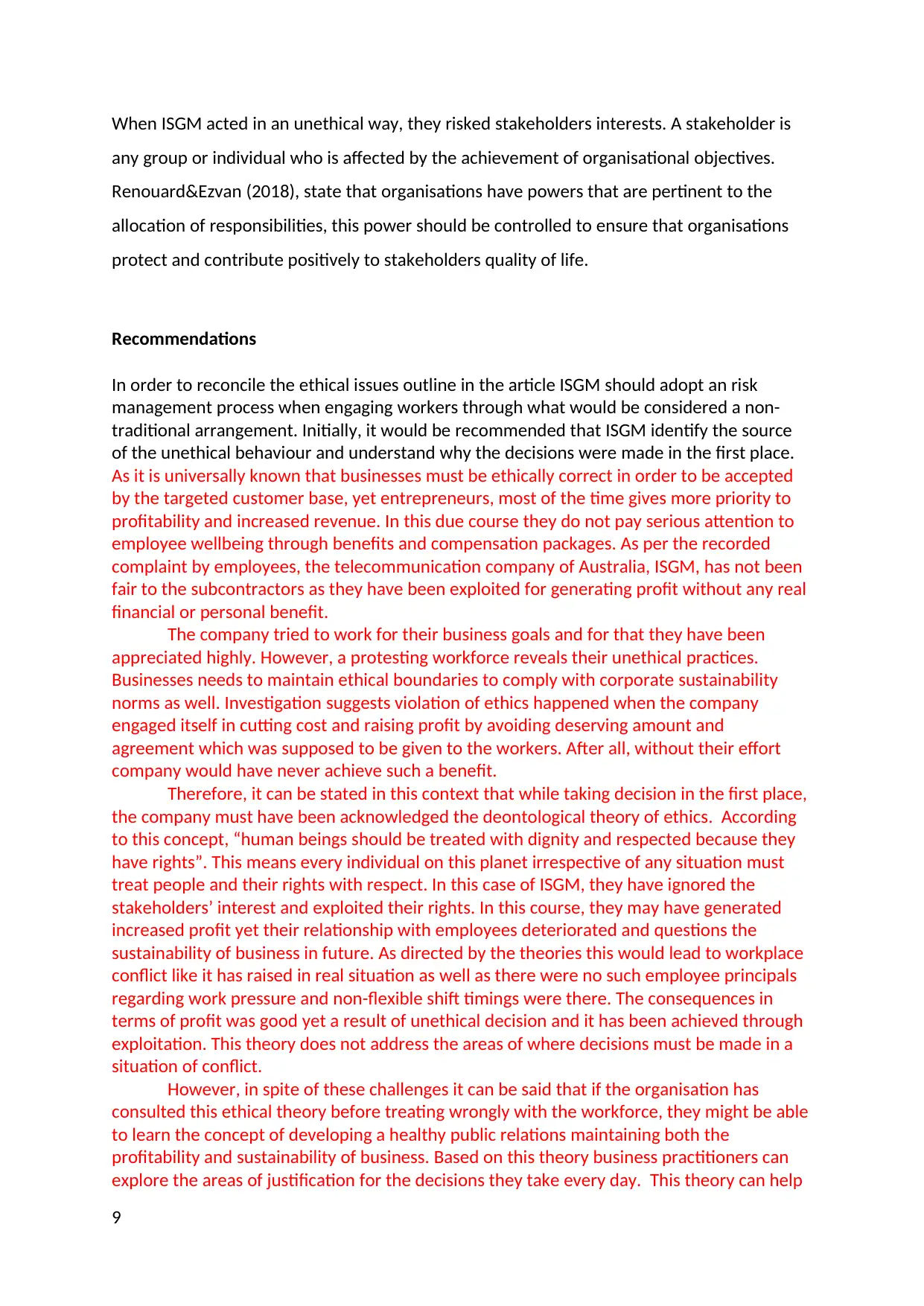
When ISGM acted in an unethical way, they risked stakeholders interests. A stakeholder is
any group or individual who is affected by the achievement of organisational objectives.
Renouard&Ezvan (2018), state that organisations have powers that are pertinent to the
allocation of responsibilities, this power should be controlled to ensure that organisations
protect and contribute positively to stakeholders quality of life.
Recommendations
In order to reconcile the ethical issues outline in the article ISGM should adopt an risk
management process when engaging workers through what would be considered a non-
traditional arrangement. Initially, it would be recommended that ISGM identify the source
of the unethical behaviour and understand why the decisions were made in the first place.
As it is universally known that businesses must be ethically correct in order to be accepted
by the targeted customer base, yet entrepreneurs, most of the time gives more priority to
profitability and increased revenue. In this due course they do not pay serious attention to
employee wellbeing through benefits and compensation packages. As per the recorded
complaint by employees, the telecommunication company of Australia, ISGM, has not been
fair to the subcontractors as they have been exploited for generating profit without any real
financial or personal benefit.
The company tried to work for their business goals and for that they have been
appreciated highly. However, a protesting workforce reveals their unethical practices.
Businesses needs to maintain ethical boundaries to comply with corporate sustainability
norms as well. Investigation suggests violation of ethics happened when the company
engaged itself in cutting cost and raising profit by avoiding deserving amount and
agreement which was supposed to be given to the workers. After all, without their effort
company would have never achieve such a benefit.
Therefore, it can be stated in this context that while taking decision in the first place,
the company must have been acknowledged the deontological theory of ethics. According
to this concept, “human beings should be treated with dignity and respected because they
have rights”. This means every individual on this planet irrespective of any situation must
treat people and their rights with respect. In this case of ISGM, they have ignored the
stakeholders’ interest and exploited their rights. In this course, they may have generated
increased profit yet their relationship with employees deteriorated and questions the
sustainability of business in future. As directed by the theories this would lead to workplace
conflict like it has raised in real situation as well as there were no such employee principals
regarding work pressure and non-flexible shift timings were there. The consequences in
terms of profit was good yet a result of unethical decision and it has been achieved through
exploitation. This theory does not address the areas of where decisions must be made in a
situation of conflict.
However, in spite of these challenges it can be said that if the organisation has
consulted this ethical theory before treating wrongly with the workforce, they might be able
to learn the concept of developing a healthy public relations maintaining both the
profitability and sustainability of business. Based on this theory business practitioners can
explore the areas of justification for the decisions they take every day. This theory can help
9
any group or individual who is affected by the achievement of organisational objectives.
Renouard&Ezvan (2018), state that organisations have powers that are pertinent to the
allocation of responsibilities, this power should be controlled to ensure that organisations
protect and contribute positively to stakeholders quality of life.
Recommendations
In order to reconcile the ethical issues outline in the article ISGM should adopt an risk
management process when engaging workers through what would be considered a non-
traditional arrangement. Initially, it would be recommended that ISGM identify the source
of the unethical behaviour and understand why the decisions were made in the first place.
As it is universally known that businesses must be ethically correct in order to be accepted
by the targeted customer base, yet entrepreneurs, most of the time gives more priority to
profitability and increased revenue. In this due course they do not pay serious attention to
employee wellbeing through benefits and compensation packages. As per the recorded
complaint by employees, the telecommunication company of Australia, ISGM, has not been
fair to the subcontractors as they have been exploited for generating profit without any real
financial or personal benefit.
The company tried to work for their business goals and for that they have been
appreciated highly. However, a protesting workforce reveals their unethical practices.
Businesses needs to maintain ethical boundaries to comply with corporate sustainability
norms as well. Investigation suggests violation of ethics happened when the company
engaged itself in cutting cost and raising profit by avoiding deserving amount and
agreement which was supposed to be given to the workers. After all, without their effort
company would have never achieve such a benefit.
Therefore, it can be stated in this context that while taking decision in the first place,
the company must have been acknowledged the deontological theory of ethics. According
to this concept, “human beings should be treated with dignity and respected because they
have rights”. This means every individual on this planet irrespective of any situation must
treat people and their rights with respect. In this case of ISGM, they have ignored the
stakeholders’ interest and exploited their rights. In this course, they may have generated
increased profit yet their relationship with employees deteriorated and questions the
sustainability of business in future. As directed by the theories this would lead to workplace
conflict like it has raised in real situation as well as there were no such employee principals
regarding work pressure and non-flexible shift timings were there. The consequences in
terms of profit was good yet a result of unethical decision and it has been achieved through
exploitation. This theory does not address the areas of where decisions must be made in a
situation of conflict.
However, in spite of these challenges it can be said that if the organisation has
consulted this ethical theory before treating wrongly with the workforce, they might be able
to learn the concept of developing a healthy public relations maintaining both the
profitability and sustainability of business. Based on this theory business practitioners can
explore the areas of justification for the decisions they take every day. This theory can help
9
⊘ This is a preview!⊘
Do you want full access?
Subscribe today to unlock all pages.

Trusted by 1+ million students worldwide
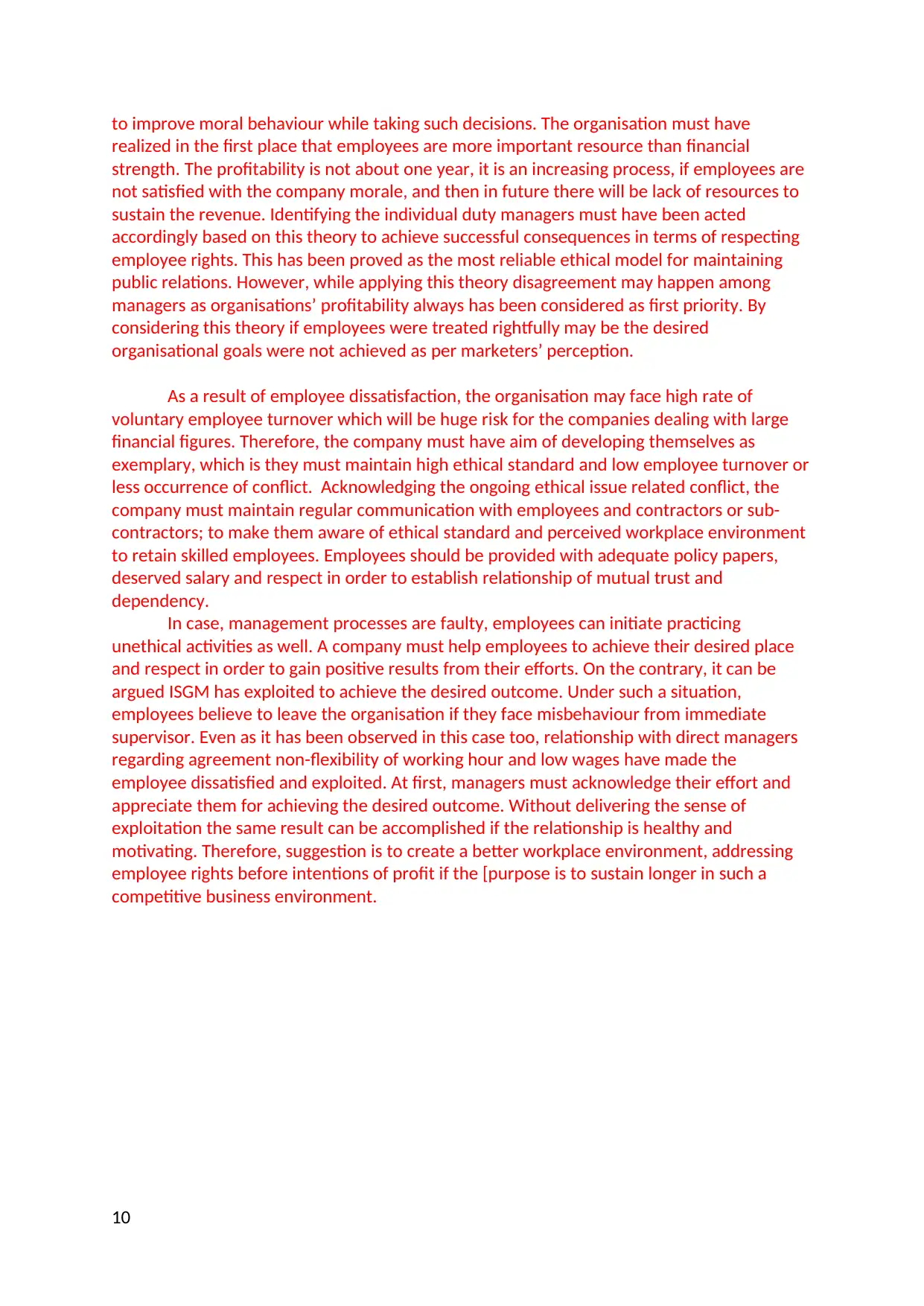
to improve moral behaviour while taking such decisions. The organisation must have
realized in the first place that employees are more important resource than financial
strength. The profitability is not about one year, it is an increasing process, if employees are
not satisfied with the company morale, and then in future there will be lack of resources to
sustain the revenue. Identifying the individual duty managers must have been acted
accordingly based on this theory to achieve successful consequences in terms of respecting
employee rights. This has been proved as the most reliable ethical model for maintaining
public relations. However, while applying this theory disagreement may happen among
managers as organisations’ profitability always has been considered as first priority. By
considering this theory if employees were treated rightfully may be the desired
organisational goals were not achieved as per marketers’ perception.
As a result of employee dissatisfaction, the organisation may face high rate of
voluntary employee turnover which will be huge risk for the companies dealing with large
financial figures. Therefore, the company must have aim of developing themselves as
exemplary, which is they must maintain high ethical standard and low employee turnover or
less occurrence of conflict. Acknowledging the ongoing ethical issue related conflict, the
company must maintain regular communication with employees and contractors or sub-
contractors; to make them aware of ethical standard and perceived workplace environment
to retain skilled employees. Employees should be provided with adequate policy papers,
deserved salary and respect in order to establish relationship of mutual trust and
dependency.
In case, management processes are faulty, employees can initiate practicing
unethical activities as well. A company must help employees to achieve their desired place
and respect in order to gain positive results from their efforts. On the contrary, it can be
argued ISGM has exploited to achieve the desired outcome. Under such a situation,
employees believe to leave the organisation if they face misbehaviour from immediate
supervisor. Even as it has been observed in this case too, relationship with direct managers
regarding agreement non-flexibility of working hour and low wages have made the
employee dissatisfied and exploited. At first, managers must acknowledge their effort and
appreciate them for achieving the desired outcome. Without delivering the sense of
exploitation the same result can be accomplished if the relationship is healthy and
motivating. Therefore, suggestion is to create a better workplace environment, addressing
employee rights before intentions of profit if the [purpose is to sustain longer in such a
competitive business environment.
10
realized in the first place that employees are more important resource than financial
strength. The profitability is not about one year, it is an increasing process, if employees are
not satisfied with the company morale, and then in future there will be lack of resources to
sustain the revenue. Identifying the individual duty managers must have been acted
accordingly based on this theory to achieve successful consequences in terms of respecting
employee rights. This has been proved as the most reliable ethical model for maintaining
public relations. However, while applying this theory disagreement may happen among
managers as organisations’ profitability always has been considered as first priority. By
considering this theory if employees were treated rightfully may be the desired
organisational goals were not achieved as per marketers’ perception.
As a result of employee dissatisfaction, the organisation may face high rate of
voluntary employee turnover which will be huge risk for the companies dealing with large
financial figures. Therefore, the company must have aim of developing themselves as
exemplary, which is they must maintain high ethical standard and low employee turnover or
less occurrence of conflict. Acknowledging the ongoing ethical issue related conflict, the
company must maintain regular communication with employees and contractors or sub-
contractors; to make them aware of ethical standard and perceived workplace environment
to retain skilled employees. Employees should be provided with adequate policy papers,
deserved salary and respect in order to establish relationship of mutual trust and
dependency.
In case, management processes are faulty, employees can initiate practicing
unethical activities as well. A company must help employees to achieve their desired place
and respect in order to gain positive results from their efforts. On the contrary, it can be
argued ISGM has exploited to achieve the desired outcome. Under such a situation,
employees believe to leave the organisation if they face misbehaviour from immediate
supervisor. Even as it has been observed in this case too, relationship with direct managers
regarding agreement non-flexibility of working hour and low wages have made the
employee dissatisfied and exploited. At first, managers must acknowledge their effort and
appreciate them for achieving the desired outcome. Without delivering the sense of
exploitation the same result can be accomplished if the relationship is healthy and
motivating. Therefore, suggestion is to create a better workplace environment, addressing
employee rights before intentions of profit if the [purpose is to sustain longer in such a
competitive business environment.
10
Paraphrase This Document
Need a fresh take? Get an instant paraphrase of this document with our AI Paraphraser
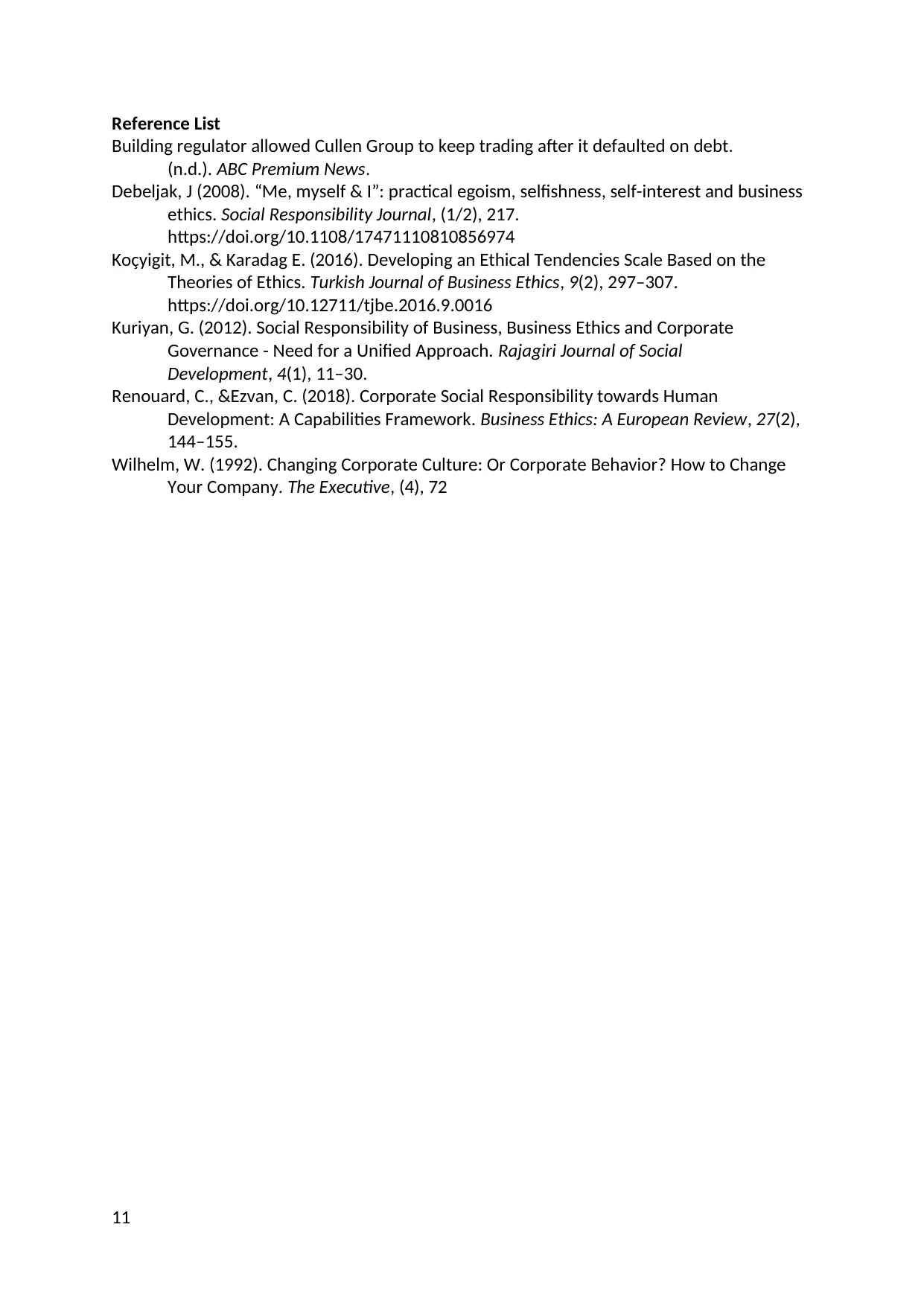
Reference List
Building regulator allowed Cullen Group to keep trading after it defaulted on debt.
(n.d.). ABC Premium News.
Debeljak, J (2008). “Me, myself & I”: practical egoism, selfishness, self-interest and business
ethics. Social Responsibility Journal, (1/2), 217.
https://doi.org/10.1108/17471110810856974
Koçyigit, M., & Karadag E. (2016). Developing an Ethical Tendencies Scale Based on the
Theories of Ethics. Turkish Journal of Business Ethics, 9(2), 297–307.
https://doi.org/10.12711/tjbe.2016.9.0016
Kuriyan, G. (2012). Social Responsibility of Business, Business Ethics and Corporate
Governance - Need for a Unified Approach. Rajagiri Journal of Social
Development, 4(1), 11–30.
Renouard, C., &Ezvan, C. (2018). Corporate Social Responsibility towards Human
Development: A Capabilities Framework. Business Ethics: A European Review, 27(2),
144–155.
Wilhelm, W. (1992). Changing Corporate Culture: Or Corporate Behavior? How to Change
Your Company. The Executive, (4), 72
11
Building regulator allowed Cullen Group to keep trading after it defaulted on debt.
(n.d.). ABC Premium News.
Debeljak, J (2008). “Me, myself & I”: practical egoism, selfishness, self-interest and business
ethics. Social Responsibility Journal, (1/2), 217.
https://doi.org/10.1108/17471110810856974
Koçyigit, M., & Karadag E. (2016). Developing an Ethical Tendencies Scale Based on the
Theories of Ethics. Turkish Journal of Business Ethics, 9(2), 297–307.
https://doi.org/10.12711/tjbe.2016.9.0016
Kuriyan, G. (2012). Social Responsibility of Business, Business Ethics and Corporate
Governance - Need for a Unified Approach. Rajagiri Journal of Social
Development, 4(1), 11–30.
Renouard, C., &Ezvan, C. (2018). Corporate Social Responsibility towards Human
Development: A Capabilities Framework. Business Ethics: A European Review, 27(2),
144–155.
Wilhelm, W. (1992). Changing Corporate Culture: Or Corporate Behavior? How to Change
Your Company. The Executive, (4), 72
11
1 out of 11
Your All-in-One AI-Powered Toolkit for Academic Success.
+13062052269
info@desklib.com
Available 24*7 on WhatsApp / Email
![[object Object]](/_next/static/media/star-bottom.7253800d.svg)
Unlock your academic potential
Copyright © 2020–2026 A2Z Services. All Rights Reserved. Developed and managed by ZUCOL.

